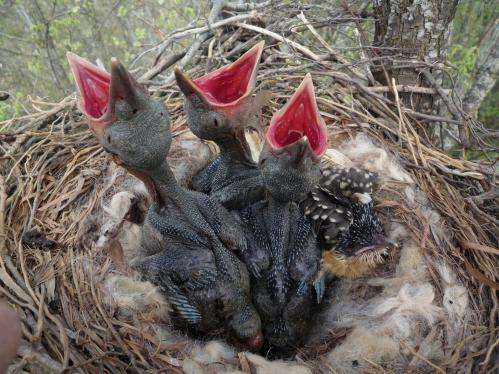March 21, 2014 report
Study shows some cuckoo birds may actually help their hosts

(Phys.org) —A team of researchers in Spain has found that at least one species of cuckoo bird may actually help its nest-mates survive. In their paper published in the journal Science, the team describes how in studying the great spotted cuckoo, they found that crow hatchlings were actually more successful due to the presence of an uninvited bird.
Most everyone knows that cuckoo birds are the ultimate free-loaders. Mothers lay their eggs in the nests of birds of different species, leaving them to raise their young for them. What many may not realize however, is that different kinds of cuckoo birds behave differently when they hatch. Some famously push all the other eggs out of the nest, leaving themselves as the sole survivor and beneficiary. Other's however, don't do that, instead, they leave the other chicks alone and share in food the mother brings, acting as an adopted sibling, of sorts. At first glance it would appear that the host birds gain no benefit from this arrangement, but upon closer inspection, that assumption has been proved wrong.
The researchers in Spain were studying the relationship between cuckoos and host carrion crows. In so doing, they were surprised to find that survival rates for crow chicks in nests shared by a cuckoo, were actually higher than for cuckoo-less nests. Looking even closer they discovered that the cuckoos had a survival mechanism that crows did not—they gave off a stink when threatened that caused predators such as feral cats to stay away. The stink, the researchers found, was caused by a chemical mix of repulsive compounds that included indoles, acids, sulfur and phenols. Taken together it proved too much for cats and birds of prey which typically find chicks in a nest easy pickings when the mother is away gathering food.
The discovery by the team came as part of a 16 year study of carrion crows that included observations of birds in 741 nests. After noting the advantage to crow chicks when a cuckoo chick was present, the team actually moved chicks around between crow nests, to find out whether it increased their chance of survival—it did, on average by 40 percent, even when there were fewer crow chicks.
The team's research shows that parasitic relationships among birds are more complicated than originally thought. Prior research has also shown that carrion crow mothers appear to understand the benefit of a cuckoo chick—upon discovery of the interloper, they treat it as their own, rather than push it out of the nest.
More information: From Parasitism to Mutualism: Unexpected Interactions Between a Cuckoo and Its Host, Science 21 March 2014: Vol. 343 no. 6177 pp. 1350-1352 DOI: 10.1126/science.1249008
ABSTRACT
Avian brood parasites lay eggs in the nests of other birds, which raise the unrelated chicks and typically suffer partial or complete loss of their own brood. However, carrion crows Corvus corone corone can benefit from parasitism by the great spotted cuckoo Clamator glandarius. Parasitized nests have lower rates of predation-induced failure due to production of a repellent secretion by cuckoo chicks, but among nests that are successful, those with cuckoo chicks fledge fewer crows. The outcome of these counterbalancing effects fluctuates between parasitism and mutualism each season, depending on the intensity of predation pressure.
Journal information: Science
© 2014 Phys.org




















